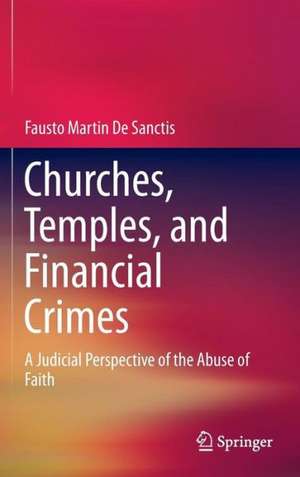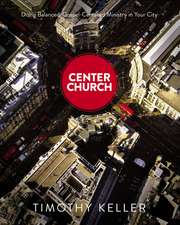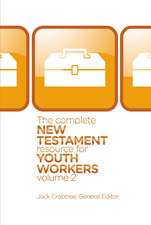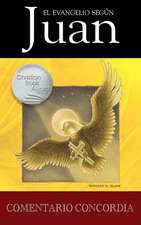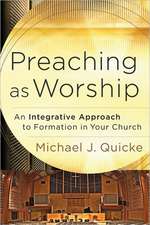Churches, Temples, and Financial Crimes: A Judicial Perspective of the Abuse of Faith
Autor Fausto Martin De Sanctisen Limba Engleză Hardback – 9 apr 2015
| Toate formatele și edițiile | Preț | Express |
|---|---|---|
| Paperback (1) | 380.84 lei 6-8 săpt. | |
| Springer International Publishing – 6 oct 2016 | 380.84 lei 6-8 săpt. | |
| Hardback (1) | 388.13 lei 6-8 săpt. | |
| Springer International Publishing – 9 apr 2015 | 388.13 lei 6-8 săpt. |
Preț: 388.13 lei
Nou
Puncte Express: 582
Preț estimativ în valută:
74.27€ • 80.93$ • 62.58£
74.27€ • 80.93$ • 62.58£
Carte tipărită la comandă
Livrare economică 23 aprilie-07 mai
Preluare comenzi: 021 569.72.76
Specificații
ISBN-13: 9783319156804
ISBN-10: 3319156802
Pagini: 115
Ilustrații: XIII, 154 p.
Dimensiuni: 155 x 235 x 17 mm
Greutate: 0.42 kg
Ediția:2015
Editura: Springer International Publishing
Colecția Springer
Locul publicării:Cham, Switzerland
ISBN-10: 3319156802
Pagini: 115
Ilustrații: XIII, 154 p.
Dimensiuni: 155 x 235 x 17 mm
Greutate: 0.42 kg
Ediția:2015
Editura: Springer International Publishing
Colecția Springer
Locul publicării:Cham, Switzerland
Public țintă
ResearchCuprins
Chapter 1: Introduction.- Chapter 2: Religious freedom.- Chapter 3: Religious organizations and their administration.- Chapter 4: Regulation to combat financial crimes committed within religious institutions.- Chapter 5: International Religious Activities and Legal Cooperation for Repatriation of Assets.- Chapter 6: Payments through Illegal and Disguised Means, and Misuse of Churches, Temples, NGOs, Trusts, Associations and Foundations.- Chapter 7: Proposals to Improve the Fight Against Financial Crimes Committed Within Temples and Churches.- Chapter 8: Conclusions.
Notă biografică
Fausto Martin De Sanctis holds a Doctorate in Criminal Law from the University of São Paulo’s School of Law (USP) and an advanced degree in Civil Procedure from the Federal University of Brasilia (UnB) in Brazil. He was a Public Defender in São Paulo from 1989-1990, and a State Court Judge, also in São Paulo, from 1990-1991, until he was appointed to the Federal Courts. He is currently a Federal Appellate Judge in Brazil’s Federal Court for the Third Region, with jurisdiction over the states of São Paulo and Mato Grosso do Sul. He is also the Deputy Director of the Federal Judicial School and a member of the Portuguese Language Law Jurists Community (CJLP). Since 2013, he has been an Advisory Council Member for the Brazil-U.S. Legal and Judicial Studies Program at American University Washington College of Law. Judge De Sanctis was selected to handle a specialized federal court created in Brazil to exclusively hear complex cases involving financial crimes and money laundering offenses. He is a world known expert on this topic and has been invited to participate in programs and conferences both in Brazil as well as internationally. From April 2 to September 28, 2012, Judge De Sanctis was a fellow at Federal Judicial Center in Washington, DC.
Textul de pe ultima copertă
This eye-opening volume examines ways in which religious institutions can be misused to mask illegal financial dealings, and steps law enforcement can take to combat these criminal activities. The chapters review legal rights and responsibilities of churches and the types of loopholes that can allow unscrupulous practices to flourish. This book offers local and global proposals for the study and practice of improving financial transparency for religious organizations, and assessing and curbing monetary crimes within their ranks. A sampling of criminal cases of financial wrongdoing by churches and temples spotlights the ingenuity involved in such scams as well as in the ongoing fight against them.
Included in the coverage:
· Religious freedom in the U.S and Brazilian constitutional orders
· Government regulation of religious organizations
· Criminal investigations and cases involving financial crimes practiced by and through religious institutions
· International religious activities and legal cooperation for repatriation of assets
· Payments through illegal and disguised means, and the misuse of churches, temples, and charitable organizations
· Proposals to improve the war against financial crimes within temples and churches
Its unique subject matter and depth ofinformation make Churches, Temples, and Financial Crimes distinctly useful for professionals involved in efforts to curb this form of crime, particularly law enforcement personnel, prosecutors, and judges.
Included in the coverage:
· Religious freedom in the U.S and Brazilian constitutional orders
· Government regulation of religious organizations
· Criminal investigations and cases involving financial crimes practiced by and through religious institutions
· International religious activities and legal cooperation for repatriation of assets
· Payments through illegal and disguised means, and the misuse of churches, temples, and charitable organizations
· Proposals to improve the war against financial crimes within temples and churches
Its unique subject matter and depth ofinformation make Churches, Temples, and Financial Crimes distinctly useful for professionals involved in efforts to curb this form of crime, particularly law enforcement personnel, prosecutors, and judges.
Caracteristici
Includes criminal cases challenging regulation of finance and accounting within religious institutions Provides a detailed understanding of the weaknesses present in the managing of churches or temples today Discusses proposals to improve the prevention against financial crimes within churches and temples Serves as a guide for law enforcement, prosecutors, judges, and others involved in efforts to curb financial crimes in religious institutions
